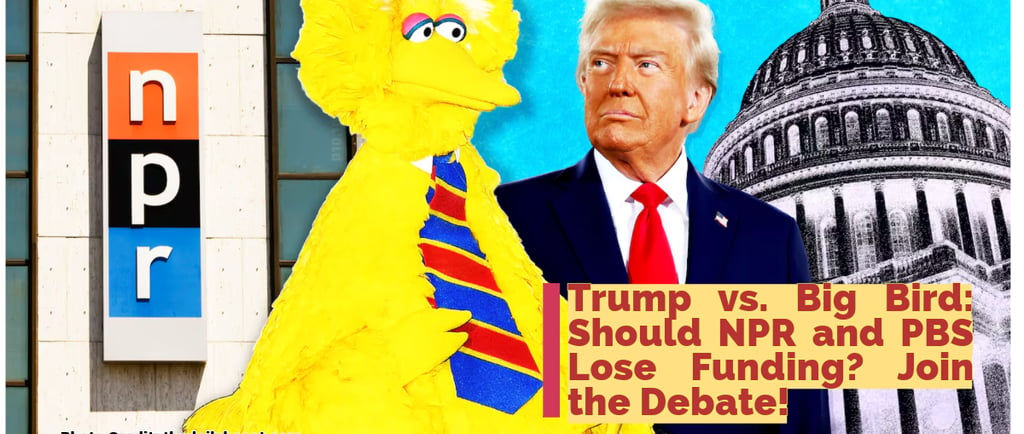Trump vs. Big Bird: Should NPR and PBS Lose Funding? Join the Debate!
Why It Matters—and What You Can Do
4/9/2025


Trump vs. Big Bird: Should NPR and PBS Lose Funding? Join the Debate!
Introduction: Why You Should Care
What if Sesame Street disappeared, or NPR stopped breaking down the news on your morning drive? On April 1, 2025, Donald Trump called for Republicans to “defund and totally disassociate” from NPR and PBS, branding them “radical left monsters.” His X post sparked a firestorm—some cheered, others mocked the idea, and a real debate about public media’s future erupted. So, what’s at stake, and why should you care? Let’s break it down and hear your thoughts!
The Context: Trump’s Attack and the Numbers
Trump’s not the first Republican to target public media. Since the Corporation for Public Broadcasting (CPB) was created in 1967, most GOP administrations have tried to cut its funding, often citing liberal bias. NPR gets just 1% of its budget from federal funds, and PBS gets 15%, through the CPB’s $535 million annual allocation—about $1.50 per American yearly, compared to $70 for the BBC in the UK (Pew Research Center, 2025-03-26). So why the big fight over such a small amount?
Public Opinion: A Partisan Divide
A March 2025 Pew survey shows 43% of Americans support continued funding for NPR and PBS, while 24% want it cut. But the divide is stark: 44% of Republicans favor defunding, compared to just 5% of Democrats (Pew Research Center, 2025-03-26). On X, reactions were heated. @acnewsitics quipped, “You’re scared of Big Bird but cozy with Putin.” @Rabid_Rabbit_1 warned of an “authoritarian playbook” to silence independent media, while @BasedMikeLee rallied support for Trump’s call.
What’s at Stake?
Public media isn’t just Elmo and NPR podcasts. The CPB funds over 1,500 local stations, especially in rural areas, providing educational shows, emergency alerts, and diverse programming commercial outlets often skip. Defunding could hit these stations hardest, limiting access for vulnerable communities (NPR, 2025-03-26). Critics like Trump argue taxpayer money shouldn’t fund “biased” media, but NPR and PBS defend their neutrality, serving diverse audiences nationwide.
Why It Matters—and What You Can Do
This debate affects you, whether you’re a parent relying on PBS, a rural listener tuning into NPR, or a fan of Frontline documentaries. If funding is cut, NPR and PBS might survive through donations, but smaller stations could close, shrinking the diversity of voices we rely on. Want to help? Share this article, contact your representatives, or become a sustainer for NPR or PBS. Your voice matters!
Let’s Hear From You!
What do you think? Comment below or share on social media with #SavePublicMedia. Here are a few questions to spark discussion:
1. Should NPR and PBS get federal funding or rely on private donations? Why?
2. Have public media, like Sesame Street or NPR, ever impacted your life? Share your story!
3. Do you think NPR and PBS are “radical left,” or do they provide balanced content? What’s your take?
Let’s keep this conversation going—the future of public media might depend on it!
hello@boncopia.com
+13286036419
© 2025. All rights reserved.